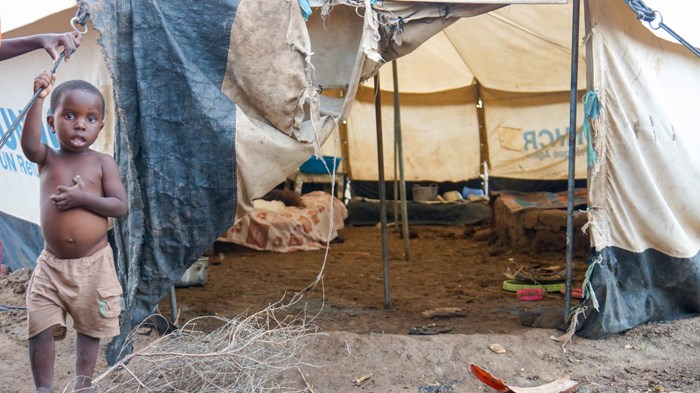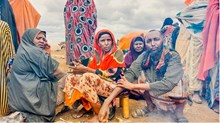Today Is World Hunger Day 2021. Will You Get In the Tent?

Women’s rights. Racial inequality. Healthcare. Education. Climate change. What do nearly all issues of justice have in common?
At their roots, they are all linked to poverty – specifically chronic hunger.
Today marks World Hunger Day, focusing on fundraising and increasing awareness of the most widespread and insidious global problem, affecting 690 million people. With the collapse of so many economies throughout the world following the COVID-19 pandemic, the need is so overwhelming that many experts describe it as a “hunger pandemic” sweeping across the world in the wake of the virus.
As Christians who are striving to do good, but better - how should we respond?
As an organization called “Food for the Hungry (FH),” this has been our central focus for 50 years. Our name was inspired by Psalm 146:7: “[God] upholds the cause of the oppressed and gives food to the hungry.”
It’s important to note that hunger isn’t solved simply by providing food. Being hungry goes beyond physical needs. People hunger for opportunity, starve for resources and thirst to be valued. Though we do work to meet tangible needs through efforts such as our food distribution, we also work to holistically serve all the needs of an individual: physical, emotional, psychological, communal and spiritual.
Hunger is the result of broken relationships. After the Fall of Adam and Eve, four types of relationships were broken: our relationship with God, the spiritual domain; our relationship with each other, the social domain; our relationship with God’s creation, the physical domain; and our relationship with ourselves, the psychological domain.
Spiritual, social, physical, and psychological hunger – or poverty – were the consequences.
And yet, Jesus came to “reconcile all things to Himself.” This gives us confidence that it is within His will and His plan to satisfy every hunger.
But how does God “give food to the hungry,” as Psalm 146 promises?
We know that God can provide all our needs and yet in His goodness He also uses us and invites us in to provide for the needs of others, if we are willing. If it's true that poverty is the result of broken relationships, then it's through God-centered reconciliation within those relationships that He meets our needs – our various forms of hunger.
Poverty is complex, but the generous ways that God provides are just as intricately connected. Ending hunger and poverty requires a holistic approach of addressing a person’s entire life, partnering with local leaders, and creating sustainable solutions implemented by entire communities.
Practically speaking, what does that look like?
Effendy Aritonang, country director for FH in Indonesia, witnessed it firsthand one day when he struck up a conversation with an aging store owner.
The woman told Effendy that she’d lost her husband and her home in a recent earthquake. She had to move into one of the temporary shelters provided by relief organizations. Then the pandemic hit.
Without a doubt, this series of events made her life very difficult. Then, through FH, she received funds to start her store. What she said next touched Effendy deeply.
"There are other organizations that worked with us,” the woman explained. “They came and brought their program to us, and then they left. But only FH staff stayed with us.
“FH staff, instead of going back to their base in the city, decided they would stay overnight with us, together, in the shelters. They lived there.
“Then they helped us to plan for our life. And this is the store that I now own. I don't feel that they just came to give me money. They helped me believe that I could rebuild my life."
Today, on World Hunger Day, God invites us to participate with Him in serving the most vulnerable.
Are you willing to get in the tent? And, perhaps, to even stay awhile?
What might that look like for you?
Come alongside.
Your presence and attention matter! Today, set aside distractions to spend focused time learning about world hunger and sustainable solutions. Mourn with those who mourn, and pray for clarity about how you can come alongside someone suffering from hunger today. Then look for opportunities and take action!
Treat those who need help like people, not projects.
It’s too easy to put emotional distance between ourselves and those experiencing poverty – “us” and “them.” This robs those we help of their humanity. And it robs us of the opportunity for a mutually transformational relationship.
Start where you are and use what you have.
The resources, connections, skills, and abilities God gave you are not accidental. He is in the process of reconciling all things to Himself, and you are a part of His interconnected solution to poverty.
How will you “get in the tent” with the hungry today?
Jordan Gustafson serves as the Director of Organizational Partnerships at Food for the Hungry (FH), a global Christ-centered NGO working in over 20 countries with the vision of seeing all forms of poverty ended by graduating communities through sustainable holistic community development and disaster relief. Jordan is additionally a Pastor, having served in both Phoenix, AZ and Washington, DC. He holds degrees from Arizona State University and Fuller Theological Seminary and regularly speaks around the country.
The Better Samaritan is a part of CT's
Blog Forum. Support the work of CT.
Subscribe and get one year free.
The views of the blogger do not necessarily reflect those of Christianity Today.





















